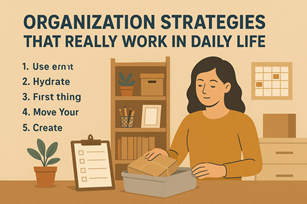Being organized isn’t about having the perfect color-coded planner or a spotless desk—it’s about creating systems that help you stay focused, save time, and reduce stress. When you’re organized, you make fewer last-minute decisions, avoid unnecessary chaos, and have more energy to dedicate to what truly matters.
The challenge is that many organizational tips sound great in theory but don’t always fit real life. That’s why we’re focusing here on strategies that are both practical and sustainable.
1. Start With a Daily To-Do List
A daily to-do list keeps your tasks visible and your mind clear. Write down everything you need to accomplish, then highlight the top three priorities. This ensures that even if your day gets busy, you still complete the most important work. Keep your list short—if it’s too long, it becomes overwhelming.
2. Break Big Projects Into Small Steps
Large projects can feel intimidating and cause procrastination. The solution? Break them into smaller, more manageable tasks. For example, instead of writing “organize the garage” on your list, write “sort boxes,” “donate unused items,” and “clean shelves.” This makes progress easier to track and more motivating.
3. Use a Digital or Physical Planner—But Stick to One
Whether you prefer a paper planner or a digital app, choose one system and commit to it. Switching between multiple tools can cause confusion and missed deadlines. The best organizational system is the one you consistently use.
4. Apply the Two-Minute Rule
If a task will take two minutes or less, do it immediately. This prevents small chores—like replying to a quick email, putting away laundry, or tossing out junk mail—from piling up and creating unnecessary clutter.
5. Declutter Regularly
Clutter can slow you down and create mental stress. Set aside 10–15 minutes each week to tidy your workspace, inbox, or living space. By making this a habit, you prevent messes from building up and becoming overwhelming.
6. Create a “Home” for Everything
When every item has a designated spot, it’s easier to find things and put them away. This applies to both your physical and digital spaces—your files, tools, and documents should be organized logically so you don’t waste time searching for them.
7. Batch Similar Tasks Together
Grouping similar activities can save time and mental energy. For example, answer all your emails in one sitting instead of checking them throughout the day, or prep multiple meals at once. Batching reduces the mental load of switching between different types of work.
8. Limit Your Daily Priorities
While it’s tempting to fill your day with tasks, focusing on fewer priorities leads to higher quality work and less stress. Try setting a maximum of three to five major tasks each day, then give them your full attention.
9. Use Reminders and Timers
Technology can be a powerful ally in staying organized. Set reminders for important deadlines, use timers to keep track of work intervals, and automate recurring tasks when possible. This takes some mental load off and ensures you stay on track.
10. Review and Adjust Weekly
At the end of each week, review what worked and what didn’t. Did you underestimate the time needed for certain tasks? Did you skip an important step? This reflection allows you to fine-tune your system so it works better over time.
Making Organization a Lifestyle
The key to staying organized is not perfection—it’s consistency. Even if you occasionally miss a step or have a messy day, the important thing is to return to your system quickly.
By implementing these practical strategies, you’ll find that daily life feels less rushed, your mind feels clearer, and you have more time for the things that matter most.












